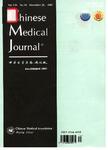Genotyping for Kidd, Kell, Duffy, Scianna, and RHCE blood group antigens polymorphisms in Jiangsu Chinese Han
Genotyping for Kidd, Kell, Duffy, Scianna, and RHCE blood group antigens polymorphisms in Jiangsu Chinese Han作者机构:Anhui Blood CenterSchool of Public HealthAnhui Medical UniversityHefeiAnhui 230031China Department of Medical MycologyInstitute of DermatologyChinese Academy of Medical Science&Peking Union Medical CollegeNanjingJiangsu 210042China Jiangsu Province Blood CenterNanjingJiangsu 210042China Medical Biotechnology InstituteSoochow UniversitySuzhouJiangsu 215007China
出 版 物:《Chinese Medical Journal》 (中华医学杂志(英文版))
年 卷 期:2012年第125卷第6期
页 面:1076-1081页
核心收录:
学科分类:0710[理学-生物学] 1002[医学-临床医学] 07[理学] 0905[农学-畜牧学] 09[农学] 071007[理学-遗传学] 090501[农学-动物遗传育种与繁殖]
基 金:Supported by a grant from the Jiangsu Province Medical Elite Program
主 题:blood group polymerase chain reaction with sequence specific priming assay genotyping donor screening
摘 要:Background Molecular testing is more precise compared to serology and has been widely used in genotyping blood group antigens. Single nucleotide polymorphisms (SNPs) of blood group antigens can be determined by the polymerase chain reaction with sequence specific priming (PCR-SSP) assay. Commercial high-throughput platforms can be expensive and are not approved in China. The genotype frequencies of Kidd, Kell, Duffy, Scianna, and RhCE blood group antigens in Jiangsu province were unknown. The aim of this study is sought to detect the genotype frequencies of Kidd, Kell, Duffy, Scianna, and RhCE antigens in Jiangsu Chinese Hart using molecular methods with laboratory developed tests. Methods DNA was extracted from EDTA-anticoagulated blood samples of 146 voluntary blood donors collected randomly within one month. Standard serologic assay for red blood cell antigens were also performed except the Scianna blood group antigens. PCR-SSP was designed to work under one PCR program to identify the following SNPs: JK1/JK2, KEL 1/KEL2, FYA/FYB, SC1/SC2, C/c and E/e. Results Serologic antigen results were identical to the phenotypes that were predicted from genotyping results. The allele frequencies for Jk^*01 and Jk^*02 were 0.51 and 0.49, respectively; for Fy^*A and Fy^*B 0.94 and 0.06; for RHCE^*C and RHCE^*c 0.68 and 0.32; and for RHCE^*E and RHCE^*e 0.28 and 0.72. Among 146 blood donors, all were KEL^*02/ KEL^*02 and SC^*01/SC^*01, indicating allele frequencies for KEL^*02 and SC^*01 close to 1.00. Conclusions The use of PCR-SSP working under the same condition for testing multiple antigens at the same time is practical. This approach can be effective and cost-efficient for small-scale laboratories and in developing counties. These molecular tests can be also used for identifying rare blood types.



